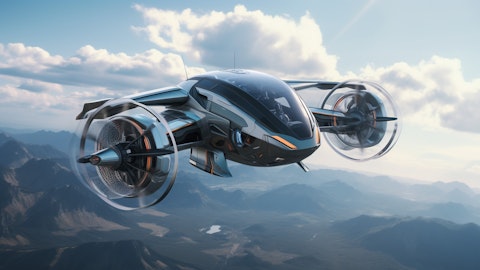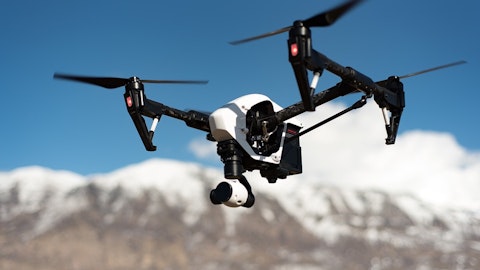Didier Papadopoulos: Yes. Hi, Savi, thanks for the great question. So the campaign we – that we just completed on the earlier airplane was obviously extremely successful, right? 1,500 flights, 33,000 miles. And it covered a lot of aspects in terms of aircraft performance, maintainability and so on that we talked about earlier. And one of the key things that it identified is that the fundamental design of the airplane is solid and it delivers on the mission that it has. The difference between that aircraft and the aircraft that we’re producing right now from the manufacturing line is that the airplanes coming out of the line right now are effectively being built under our production manufacturing line, following our quality management system, which really drives us and progresses us towards the production certificate, right?
So as a reminder, we need a type certificate, a production certificate, and operational certificates, right, that Bonny talked about. That production certificate element is one of the unique things and really exciting things to be exercising right now with the airplanes rolling out the line right now.
Savi Syth: That’s helpful. And then the type of flying is just kind of progressing the same way as you did with the first one.
Didier Papadopoulos: Absolutely. Very similar type of flying between all these airplanes.
Savi Syth: Got it. And I appreciate the color on the operation side. And I was just wondering, we’ve gone from famine last year to feast this year on pilot availability for the mainline and cargo airlines. But generally, I think pilot supply is going to kind of remain tight over a longer period of time. So I don’t know, Bonny, do you have any thoughts if Joby can be the solution for the Part 121 operators? And also, just as you look to stand-up operations, just how long before you launch operations do you need to start building your own pilot supply?
Bonny Simi: Thank you, and it’s great to be joining the team here on the call, and thank you for the question. This is definitely right down my alley. As a pilot for 30 years, I know that the shortage has been a factor off and on for years. And – but we’re not concerned, because for us, in the early years of operations, we’re going to utilize what we call an initial cadre of experienced pilots that draw from demand of two focus areas. One, there’s a group of pilots, initial cadre, who enjoy being part of new aircraft introductions. And so, we even now, we constantly get outreach from pilots who want to be part of something new. And these are very experienced pilots. And then as a pilot of myself and as a mother, I know a significant number of pilots who really favor solutions of being home every night.
Military pilots tired of being away from home, and mothers and fathers trying to raise a kid. And so, this is a solution for them. So there are many female pilots in particular who opted out of, they got their commercial pilot’s license, and then they decided that it just wasn’t going to work for them. So bringing them back into the fold. And then behind that group of several hundred pilots for our initial cadre, we’re already building a pipeline of pilots. So we’ve got our Joby Aviation Academy, where we’re building out a Part 141 program, we’re starting with our employees and then ramping that up so that’ll sink in time for us to scale service. And, yes, we actually look at as our solution, as a piece of the solution for the broader 121, because pilots will spend a couple years with us and some may move on to the airlines, and some actually will find the lifestyle very favorable for them.
Savi Syth: That’s helpful. Thank you.
Operator: And the next question comes from the line of David Zazula with Barclays. Please proceed.
David Zazula: Hi, thanks for taking the question. Good afternoon. First one is for Didier. If I could just get a little more color on the electric storage qualification plans that you’ve submitted, any feedback you’ve gotten from the FAA on that and what the plan is to progress along electric storage and propulsion certification kind of in the near term.
Didier Papadopoulos: Yes. So, in general, the electrical system distribution system has multiple test plans that we submit to the FAA. Some of them are associated with qualification and relating to the environment, for example. Others are operational in terms of being able to manage the state of charge of the aircraft. So they vary in multiple areas. I think one thing that’s really important relating to your question about the feedback is most of these have been in work with the FAA for multiple years, right? So for the most part, those are not things that were dropping on the FAA for the first time here. They’ve been going back and forth with the FAA on multiple occasions. They’re the result of not only discussions with the FAA, but also, more importantly, the result of actual flights that we’ve executed on the two airplanes over the past four years.
So the results are really – exchanges are really positive with the FAA. In fact, just before this call, we were on a call with the FAA discussing that, as well as a visit. They’re coming to Joby to discuss some other remaining items. So overall, very, very positive. Maybe one last item on that. And that’s what really gives us the ability and the commitment to go and invest in testing facilities, like we’ve talked about a few minutes ago. The investments we have in our battery facilities are really a testament to the confidence we have with those test plans.
David Zazula: Thanks. Very helpful. And if I could just follow up on an earlier question, specific to the exclusivity in the UAE agreement, could you just give a little more on the level of exclusivity that you’re expecting to see there out of the agreement and then how that would play into the inter Emirate travel that I think you mentioned in the letter.
JoeBen Bevirt: Yes. So again, we have a six-year exclusive for providing air taxi service in the Emirate of Dubai. And that is granted to us by the RTA, which is the authority that has been given the purview to regulate air taxis. And so this is a partnership that we’ve been working on since. 2018 – 2017, 2018. And it’s fantastic to seeing it coming to fruition. And very grateful for Bonny and the operations team for leaning in on preparing for operations there, and also very grateful for Didier and the certification team on the work they’re doing with the GCA to begin laying the groundwork for type certification. So again, we’re very pleased with the progress in the UAE as we are very pleased with the progress that we’re making here in the U.S. with the FAA and the excitement that we’re seeing from countries around the world for this really important new technology.
Operator: And the next question comes from the line of Edison Yu with Deutsche Bank. Please proceed.



